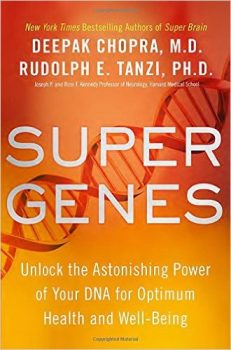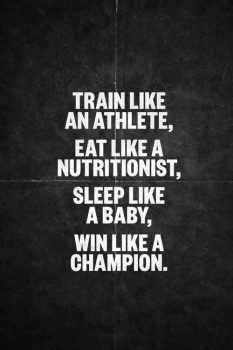When I saw this meme on Twitter, I was inspired for 30 seconds and then I laughed. Who’s going to do all this? Maybe a competitive athlete – and that person doesn’t need a meme. But this time of year we come at ourselves with demands like this one. ‘Tis the season for self-improvement and we want to change everything, all at once, and have it last forever. No wonder New Year’s Resolutions are often dismal failures.
 I was fortunate this year to read a book in December that saved me from the Resolution black hole in January. It’s SuperGenes, by Deepak Chopra, MD, and Rudolph Tanzi, PhD, a fascinating exploration of epigenetics, a new school of scientific thought suggesting that altering our lifestyle may not just make us feel better about ourselves, but that it might actually alter our genetic makeup. This is Darwin on steroids and quite exciting. It’s about “telling” our genes what to express – their highest potential for health and longevity – and what to ignore, i.e., the inclination to develop some disease that “runs in the family.”
I was fortunate this year to read a book in December that saved me from the Resolution black hole in January. It’s SuperGenes, by Deepak Chopra, MD, and Rudolph Tanzi, PhD, a fascinating exploration of epigenetics, a new school of scientific thought suggesting that altering our lifestyle may not just make us feel better about ourselves, but that it might actually alter our genetic makeup. This is Darwin on steroids and quite exciting. It’s about “telling” our genes what to express – their highest potential for health and longevity – and what to ignore, i.e., the inclination to develop some disease that “runs in the family.”
But here’s where it gets practical and wonderful and usable right now, today, for any of us. The authors are adamant that to make sweeping changes, at the first of the year or any time, is simply a way to fail. Instead, they suggest making one doable change per week, a change you plan to incorporate into your life. They’re clear that this is not one change in several areas – diet, exercise, stress management, sleep, relationships, organization, work – but one change in one area. Period.
Not only that, they suggest starting with easy changes. In their view, becoming consistent with vigorous exercise is really tough for most people, so they suggest putting off those kinds of commitments until you’ve put several new but less daunting habits into practice, so when you approach something really challenging, you come to it as someone who aces stuff.
The built-in brilliance of this approach includes the ability to give yourself an extra week if you can’t something perfectly right off. Here’s how it worked for me: my first habit to adopt was to stand when I’m riding the subway. We know that standing is a boon to health and a known preventative to heart failure in later life. “Sitting is the new smoking” is not an unfamiliar phrase to most of us. I’m on the subway here in NYC a bare minimum of 30 minutes a day, sometimes as long as 90 minutes. That’s a lot of sitting time that could be invested in my health-promoting “standing account.” So I started. Unless there’s an extenuating circumstance – like riding with someone who wants to sit, and standing over them would be rude – I stand. That one was easy to get down in a week.
The next commitment was to meditate every day without missing. I’ve meditated for years, but I’d gotten sloppy and was  missing two or three days a week. So I made my 7-day commitment to get back in that daily habit and now I’m there, keeping track with my Insight Timer, an adorable little app that times your private meditation, offers guided meditations for people who like those, and has some social groups for app users, including “Veggie Meditators.”
missing two or three days a week. So I made my 7-day commitment to get back in that daily habit and now I’m there, keeping track with my Insight Timer, an adorable little app that times your private meditation, offers guided meditations for people who like those, and has some social groups for app users, including “Veggie Meditators.”
Week 3 I opted to add “walk 10 minutes after dinner.” The idea wasn’t any kind of race walk or sweat-fest, just to follow the Ayurvedic suggestion to take a short stroll after supper as an aid to digestion and sound sleep. The first couple of days, it worked great, but then my husband came back from out of town, encouraging me to eat with him while watching TV, often some movie that would get me sufficiently hooked that my planned 10-minute walk was looking like a try-that-again-next-year New Year’s resolution.
But I didn’t want to give up on it, so I opted to give myself another week for this one to take hold. I told William that we were going to eat the table, no matter what, and that I’d take a ten-minute walk after that. He might have rolled his eyes, but by the third night he was saying he ought to be walking with me.
While each of these is a small shift in itself, the authors frequently reminded me as I read SuperGenes that doing this results in 52 changes over a year. Nobody makes 52 New Year’s resolutions – nobody sane anyway – and yet that’s what we can accomplish in a year’s time by taking a kinder, gentler approach.
 What I did write down on New Year’s Eve was a list of small, weekly changes I may want to undertake during 2017. Nothing is in granite, however. If there are things on that list I don’t get to this year, I’ll still have made 52 tiny but powerful shifts before we next watch the ball drop in Times Square. I cordially invite you to join me. Let me know on social media and by calling into the Main Street Vegan podcast when it’s live on Wednesdays from 3 to 3:55 Eastern Time (816-347-5190) and share what you’re accomplishing. Dr. Rudoph Tanzi, SuperGenes coauthor, a longtime vegetarian and near vegan, will be on the program this spring (April 26 is the date I’m holding for him). By then I’ll have made 16 more sweet, subtle life improvements. If this seems appealing, you can do it too.
What I did write down on New Year’s Eve was a list of small, weekly changes I may want to undertake during 2017. Nothing is in granite, however. If there are things on that list I don’t get to this year, I’ll still have made 52 tiny but powerful shifts before we next watch the ball drop in Times Square. I cordially invite you to join me. Let me know on social media and by calling into the Main Street Vegan podcast when it’s live on Wednesdays from 3 to 3:55 Eastern Time (816-347-5190) and share what you’re accomplishing. Dr. Rudoph Tanzi, SuperGenes coauthor, a longtime vegetarian and near vegan, will be on the program this spring (April 26 is the date I’m holding for him). By then I’ll have made 16 more sweet, subtle life improvements. If this seems appealing, you can do it too.
Note: The book SuperGenes is one I highly recommend and one I know I’ll read many more times. I do need to offer a caveat, however: It contains many, many descriptions of animal experiments, both physical and psychological testing done on and to animals in laboratories. I do not condone animal experimentation and having to read through it (or skip over it) is my one criticism of this book.
 Victoria Moran is a vegan of 33 years and the author of books including Main Street Vegan and The Love-Powered Diet. She is coauthor with JL Fields of The Main Street Vegan Academy Cookbook, coming in December 2017 from BenBella Books. Victoria is shown here with Joel Kahn, MD; the two of them will serve through October 2017 as Peta’s Sexiest Vegans Over 50.
Victoria Moran is a vegan of 33 years and the author of books including Main Street Vegan and The Love-Powered Diet. She is coauthor with JL Fields of The Main Street Vegan Academy Cookbook, coming in December 2017 from BenBella Books. Victoria is shown here with Joel Kahn, MD; the two of them will serve through October 2017 as Peta’s Sexiest Vegans Over 50.


